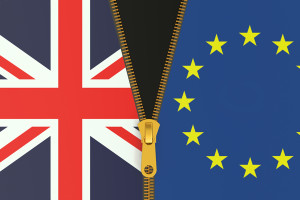German Chancellor Angela Merkel said the European Union needs to work hard to overcome the shock of Britain’s vote to leave, calling it a watershed moment as EU leaders ponder the way forward.
“We have begun a so-called process of reflection to explore in which areas we should develop further as a priority,” Merkel told reporters in the Estonian capital of Tallinn on Thursday. “All families occasionally need phases in which they think about where they go from here.”
Merkel is touring eastern Europe to canvass opinion among EU governments in preparation for a summit of all 28 leaders except U.K. Prime Minister Theresa May in Bratislava on Sept. 16. With stops in Prague later Thursday and Warsaw on Friday before returning to Berlin, Merkel plans to hold talks with 12 EU fellow leaders over the next 48 hours.
The U.K.’s referendum in June on leaving the EU “is a watershed in European development and in the success story of European integration,” Merkel said. “I think we can overcome Britain’s decision. But we have to work hard to do that.”
Merkel said Wednesday she “can allow the time” for the U.K. to decide what it wants from the EU in Brexit talks. The other 27 member countries will press ahead with “the European project” in the meantime, she said after arriving in Tallinn.

“As we have said, as long as Britain hasn’t submitted its application, we can’t answer the question of what kind of a relationship we envision,” Merkel said. The remaining EU countries have enough topics to discuss among themselves to “allow the time that Britain wants to take to figure out what relationship it wants with the EU.”
Swedish Prime Minister Stefan Loefven, whom Merkel plans to meet on Friday along with his counterparts from the Netherlands, Finland and Denmark, said EU government leaders need to show citizens “that our cooperation is sufficiently robust” to tackle challenges. In a statement from his office, he cited youth unemployment, refugees and climate change.
Estonia’s proximity to Russia lifted European security matters onto the agenda as Merkel met Taavi Roivas, the Baltic nation’s prime minister. Russia’s actions against Ukraine broke international law, a “reality” that must be weighed against “the very widespread desire in Germany to have a constructive relationship with Russia,” Merkel said. “I want that, too.”

